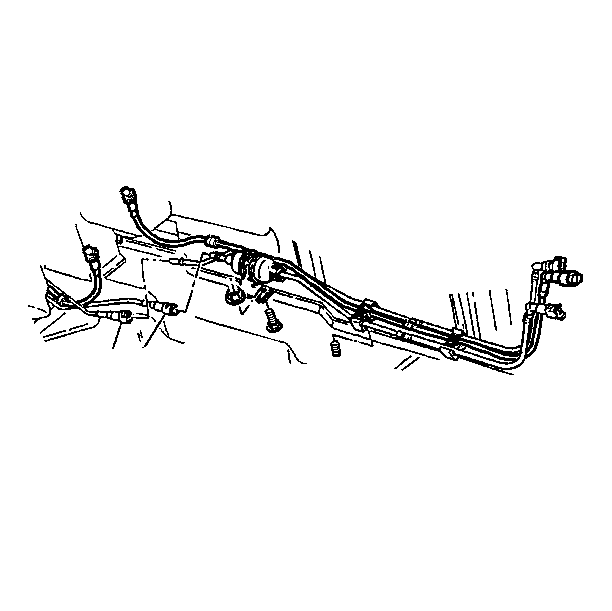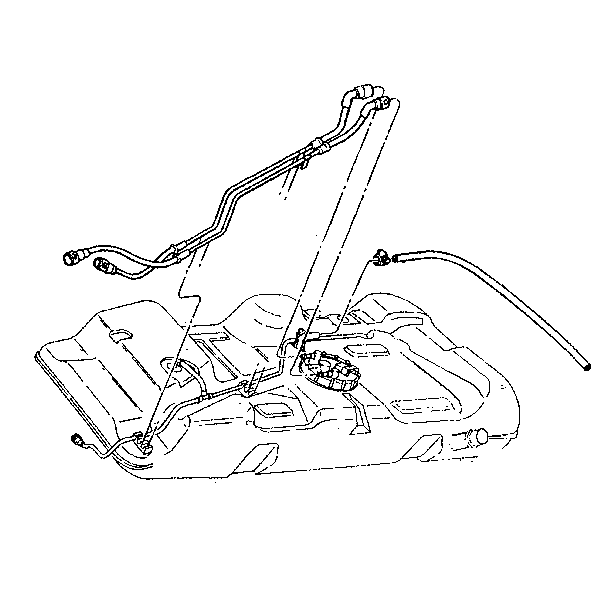Removal Procedure

Caution: In order to reduce the risk of fire and personal injury observe the
following items:
| • | Replace all nylon fuel pipes that are nicked, scratched or damaged
during installation, do not attempt to repair the sections of the nylon fuel
pipes |
| • | Do not hammer directly on the fuel harness body clips when installing
new fuel pipes. Damage to the nylon pipes may result in a fuel leak. |
| • | Always cover nylon vapor pipes with a wet towel before using a
torch near them. Also, never expose the vehicle to temperatures higher than
115°C (239°F) for more than one hour, or more than 90°C (194°F)
for any extended period. |
| • | Apply a few drops of clean engine oil to the male pipe ends before
connecting fuel pipe fittings. This will ensure proper reconnection and prevent
a possible fuel leak. (During normal operation, the O-rings located in the
female connector will swell and may prevent proper reconnection if not lubricated.) |
Notice: Do not attempt to straighten any kinked nylon fuel lines.
Replace any kinked nylon fuel feed or return pipes in order to prevent damage
to the vehicle.
- Relieve the fuel system fuel pressure.
Refer to
Fuel Pressure Relief
.
- Drain the fuel tank. Refer to
Fuel Tank Draining
.
- Raise the vehicle. Refer to
Lifting and Jacking the Vehicle
in general information.
- Remove the quick-connect fittings on the fuel feed and return
pipes at the in-pipe fuel filter. Refer to
Plastic Collar Quick Connect Fitting Service
.
- Cap the fuel sender fuel pipes and the in-pipe fuel filter pipes
as needed to stop any fuel leakage.
- Remove the fuel tank. Refer to
Fuel Tank Replacement
.

- Remove the fuel feed and
fuel return pipe attaching hardware.
- Remove the fuel feed and fuel return pipes from the fuel tank.
- Note the position of the fuel feed and return pipes and attaching
hardware for installation.
Installation Procedure
Caution: In order to reduce the risk of fire and personal injury observe the
following items:
| • | Replace all nylon fuel pipes that are nicked, scratched or damaged
during installation, do not attempt to repair the sections of the nylon fuel
pipes |
| • | Do not hammer directly on the fuel harness body clips when installing
new fuel pipes. Damage to the nylon pipes may result in a fuel leak. |
| • | Always cover nylon vapor pipes with a wet towel before using a
torch near them. Also, never expose the vehicle to temperatures higher than
115°C (239°F) for more than one hour, or more than 90°C (194°F)
for any extended period. |
| • | Apply a few drops of clean engine oil to the male pipe ends before
connecting fuel pipe fittings. This will ensure proper reconnection and prevent
a possible fuel leak. (During normal operation, the O-rings located in the
female connector will swell and may prevent proper reconnection if not lubricated.) |

- Remove the caps from the
fuel sender fuel pipes.
- Install new plastic connector retainers on the in-pipe fuel filter
pipes and on the fuel sender fuel pipes.
- Install the new fuel feed, fuel return pipes to the fuel tank
as noted during removal.
- Connect the quick-connect fittings on the fuel feed, and return
pipes at the fuel tank. Refer to
Plastic Collar Quick Connect Fitting Service
.
- Install the fuel pipe attaching hardware as noted during removal.
- Install the fuel tank. Refer to
Fuel Tank Replacement
.

- Remove the caps from the
in-pipe fuel filter pipes.
- Connect the quick-connect fittings on the fuel feed and return
pipes at the in-pipe fuel filter. Refer to
Plastic Collar Quick Connect Fitting Service
.
- Add fuel, and tighten the fuel fill cap.
- Connect the negative battery cable. Refer to
Battery Negative Cable Disconnection and Connection
in engine electrical.
- Inspect for fuel leaks using the following procedure:
| 11.1. | Turn ON the ignition, for 2 seconds. |
| 11.2. | Turn OFF the ignition, for 10 seconds. |
| 11.3. | Turn ON the ignition. |
| 11.4. | Inspect for fuel leaks. |




